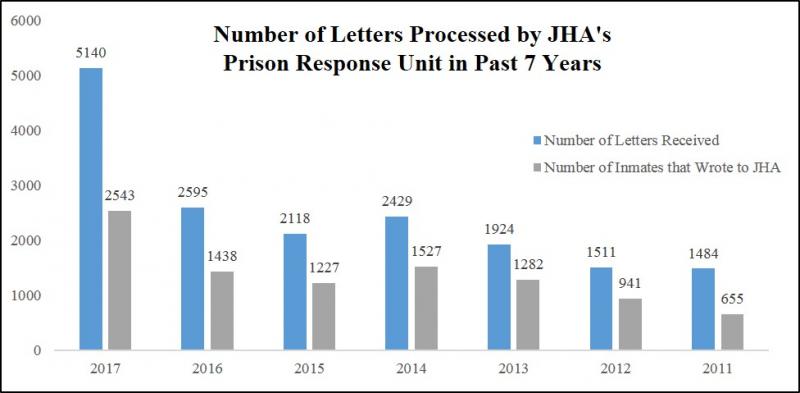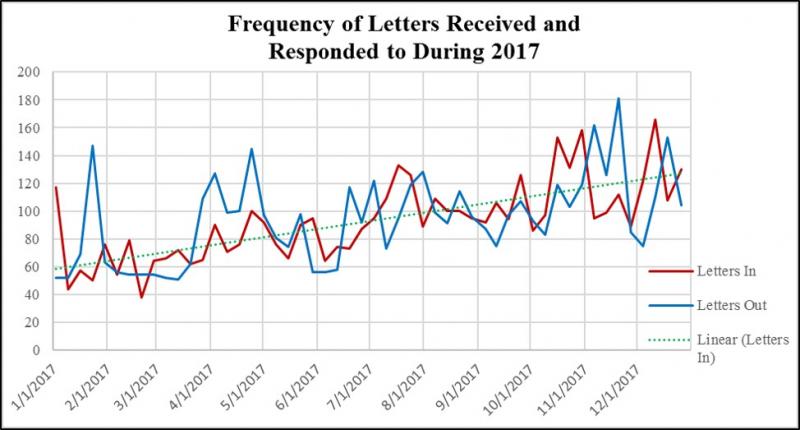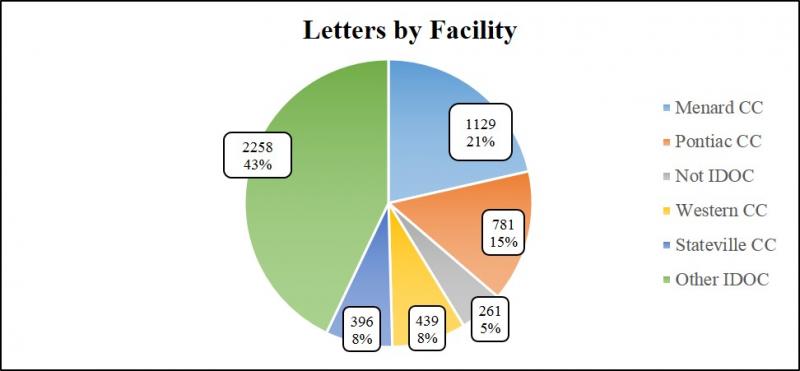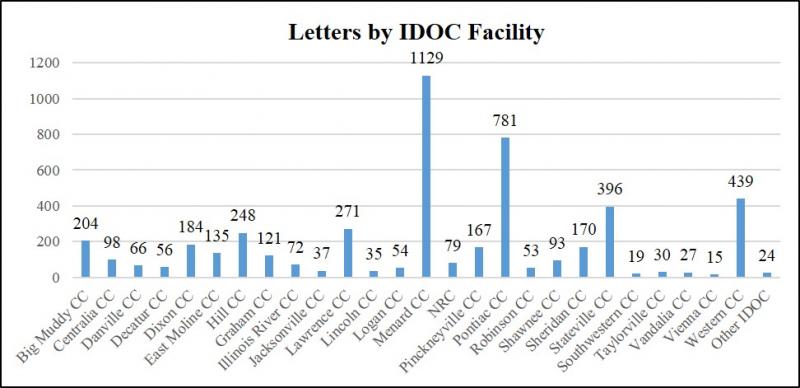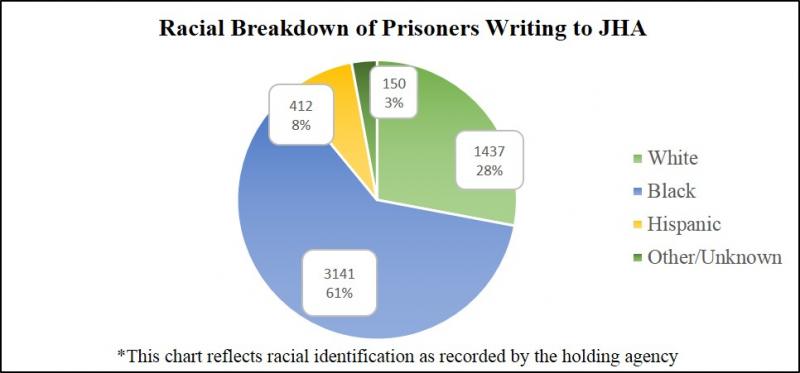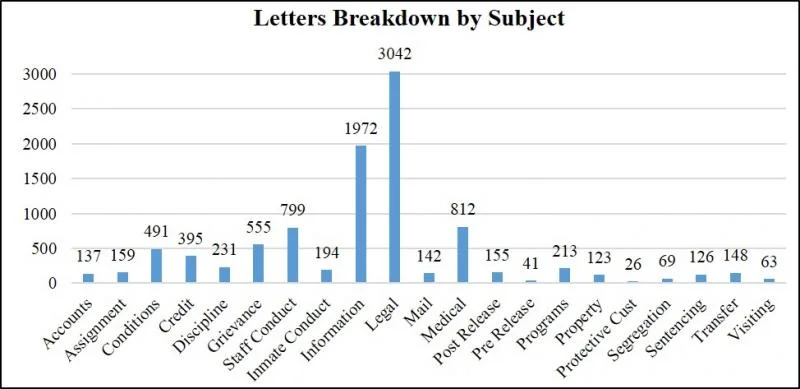Prison Communications 2017
The following provides data on the letters from prisoners received and responded to by JHA during the 2017 calendar year. During 2017, JHA processed nearly twice as many letters as the prior year: 5,140 letters from 2,543 individuals who were housed in a prison or jail. Of the 2,543 people who wrote JHA in 2017, more than half (1,866) contacted JHA for the first time. In addition, JHA received and responded to more than 579 calls and emails from people in the community.
In 2017 there was a sizeable increase in the PRU’s work in the area of prisoner information services, with requests for information constituting the majority (65%) of the mail JHA received and responded to this past year. Along with the increase in the number of information packets that JHA enclosed with outgoing letters, there was an attendant rise in our costs due to these larger packets exceeding the standard rate for a first-class letter, which is 46 cents for metered mail. This resulted in JHA spending between one and two hundred dollars weekly on postage, in addition to the cost of stationery, maintaining office equipment, and other expenses.
The chart above shows that although the number of letters JHA received and responded to during 2017 trended upward (noted by the green dotted line), the number of letters received and responded to each week fluctuated. Peaks in the number of letters processed were often responsive to an event, such as a JHA monitoring visit, a change in the law or IDOC policy, or other independent factors.
The following data reflects a summary of correspondence from prisoners received and responded to by JHA during 2017:
While JHA’s monitoring activities currently involve mostly IDOC facilities, we continue to hear from and respond to prisoners in many different settings. The “Not IDOC” category above includes facilities that are not part of IDOC, such as county jails, federal facilities, or facilities in other states. The “Other IDOC” category is composed of all IDOC facilities other than the four most-frequently-heard-from IDOC facilities for 2017: Menard, Pontiac, Stateville, and Western, the first three of which were also the most frequently heard from for 2016. These facilities are also the male maximum facility prisons within IDOC which JHA visits more often and where JHA is more commonly known to longer-term prisoners.
The above chart reflects JHA’s tracking of letters according to the prison a letter is about rather than the prison the letter was mailed from. Although most letters mailed from a prison are about that prison, not all are, and some letters raise issues about multiple facilities.
JHA codes letters by issues raised or the type of information requested by prisoners. A letter may raise multiple issues or contain requests for several types of information. Thus, the total numbers in this chart exceed the number of letters processed. The top three codes (please see Code Glossary below for more detailed definitions of each code) for 2017 were Legal, Information, and Medical, with Staff Conduct letters coming in a close fourth.
Code Glossary
Accounts: Commissary, Inmate Trust Account, Inmate Benefit Fund, State Pay, Indigent Status
Assignment: Cell Assignment, Job Assignment, Classification
Conditions: Temperature, Water, Food, Clothing, Sanitation, Security, Overcrowding, etc.
Credit: All forms of sentencing credit this is awarded or revoked by IDOC
Discipline: Issues related to inmate disciplinary process
Grievance: Issues related to the process by which people imprisoned attempt to have problems resolved by correction officials
Staff Conduct: Complaints as to staff not following rules and disagreements with staff implementation of discretionary authority
Inmate Conduct: Complaints from one inmate about another inmate(s)
Information: Requests for a wide range of materials, including JHA reports, articles, resource guides, etc.
Legal: Requests for printouts of case law and statutes, legal information, legal forms, etc.
Mail: Issues related to mail delivery to and from prisons/jails
Medical: Complaints as to quality of care received or lack of care
Post-Release: Door violators, host site approval, Mandatory Supervised Release (MSR, or parole) violations, MSR conditions, etc.
Pre-Release: Adult Transition Centers (work release), Electronic Detention, etc.
Programs: Educational programs, lack of educational programs, treatment programs, etc.
Protective Custody: Inmate requests to be specially housed and concerns related to protective custody practices
Segregation: Administrative detention, privileges/lack of privileges while housed in disciplinary unit, etc.
Sentencing: Questions and concerns related to how an inmate’s sentence is being calculated, and how IDOC is classifying his/her offense
Transfer: Requests from inmates to be transferred to another prison, have security classification reduced, serve MSR term out of state, etc.
Visiting: Issues related to prison visiting rooms and restrictions, plus telephone contact
